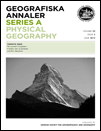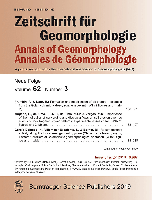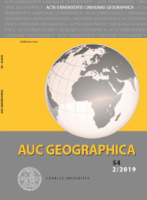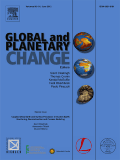
GEOGRAFISKA ANNALER SERIES A-PHYSICAL GEOGRAPHY
metrics 2024
Illuminating the Forces Shaping Our Environment
Introduction
Geografiska Annaler Series A-Physical Geography, published by Taylor & Francis Ltd, is a leading academic journal dedicated to the advancing field of physical geography. With a rich publication history spanning from 1979 to 2024, this journal stands out in its categories, being positioned in the Q2 quartile for both Geography, Planning and Development and Geology in 2023. The journal is recognized for its contribution to Earth and Planetary Sciences, evidenced by its Scopus rankings placing it in the top 31% and 32% of its respective disciplines. Belonging to a distinguished publisher from the United Kingdom, it provides a vital platform for researchers, professionals, and students to disseminate and engage with cutting-edge research. While the journal does not currently offer open access, it remains a pivotal resource for those involved in the study of physical geography, offering insights that enhance our understanding of the Earth's processes and environments.
Metrics 2024
 0.40
0.40 1.40
1.40 1.40
1.40 58
58Metrics History
Rank 2024
Scopus
IF (Web Of Science)
JCI (Web Of Science)
Quartile History
Similar Journals

Geologos
Exploring Earth and Beyond: Where Knowledge Meets DiscoveryGeologos is a peer-reviewed journal dedicated to advancing knowledge in the field of Earth and Planetary Sciences. Published by SCIENDO, this Open Access journal has been facilitating unrestricted access to research findings since 2009, ensuring that scholars, professionals, and students can engage with up-to-date scientific discourse without barriers. With an ISSN of 1426-8981 and an E-ISSN of 2080-6574, Geologos is indexed in Scopus, where it currently holds a rank of #111 out of 195 in the General Earth and Planetary Sciences category, reflecting its commendable impact within the discipline. Based in Poland, the journal embraces contributions from international authors, promoting a diverse and inclusive dialogue on topics ranging from geological phenomena to planetary processes. As a Q3 journal in the Earth and Planetary Sciences category, Geologos is committed to enhancing the understanding and appreciation of the Earth's systems, making it an essential resource for those engaged in research and practice within this dynamic field.

Quaternary Science Advances
Pioneering Research for a Sustainable FutureQuaternary Science Advances, published by ELSEVIER, is a distinguished open access journal that has rapidly gained recognition in the fields of Earth and Planetary Sciences since its inception in 2020. With an impressive impact factor reflected by its Q2 ranking across various categories including Earth-Surface Processes and Geology, this journal serves as a vital platform for researchers and professionals aiming to advance the understanding of Quaternary environments and processes. Positioned within the 73rd percentile in Earth and Planetary Sciences and bolstered by a robust global readership, Quaternary Science Advances not only facilitates the dissemination of high-quality research but also encourages interdisciplinary collaboration. The journal’s open access model ensures that cutting-edge findings are readily available to students, researchers, and practitioners across the globe. With a commitment to promoting innovative studies from 2020 to 2024 and beyond, this journal remains a cornerstone for advancing knowledge within the dynamic landscape of Earth sciences.

ZEITSCHRIFT FUR GEOMORPHOLOGIE
Connecting Science and Landscape: Insights from Geomorphology.ZEITSCHRIFT FUR GEOMORPHOLOGIE is a prestigious journal dedicated to the field of geomorphology, published by GEBRUDER BORNTRAEGER from Germany. With the ISSN 0372-8854 and E-ISSN 1864-1687, this journal serves as a vital platform for researchers, professionals, and students interested in understanding the dynamic processes that shape our Earth’s surface. The journal has consistently maintained a solid academic reputation, achieving a Q3 ranking in key categories including Earth and Planetary Sciences (miscellaneous), Earth-Surface Processes, and Geography, Planning and Development as of 2023. This reflects its position within the global scientific community; ranked at #93 out of 179 in Earth-Surface Processes, contributing to crucial discussions surrounding environmental changes and landform evolution. Although ZEITSCHRIFT FUR GEOMORPHOLOGIE is not an Open Access publication, it offers extensive insights and findings from converged years spanning from 1979 to 2019 and again from 2021 to 2022. The journal is located at Johannesstr 3A, D-70176 Stuttgart, Germany, and plays a pivotal role in advancing geomorphological research that impacts natural sciences, ecology, and planning strategies worldwide.

GEOSCIENCES JOURNAL
Advancing Knowledge in Earth and Planetary Sciences.Welcome to the GEOSCIENCES JOURNAL, a pivotal publication in the fields of Earth and Planetary Sciences and Environmental Science, proudly presented by the Geological Society of Korea. Established in 1997, this journal has become a prominent platform for researchers, professionals, and students, offering a rich collection of peer-reviewed articles that explore a diverse array of geoscientific topics. With an impressive Q2 ranking in both Earth and Planetary Sciences and Environmental Science categories for 2023, it stands as an essential resource in the academic community. Though it operates under a traditional subscription model, GEOSCIENCES JOURNAL remains dedicated to advancing knowledge through rigorous research. Addressed from its headquarters in Seoul, South Korea, the journal aims to foster a deeper understanding of geosciences, encouraging innovation and collaboration in tackling today’s environmental challenges.

Quaestiones Geographicae
Empowering Global Perspectives on Earth’s PhenomenaQuaestiones Geographicae, an esteemed open-access journal published by SCIENDO, serves as a vital platform for scholarly communication in the field of Earth and Planetary Sciences. Since its inception in 1979, the journal has been dedicated to promoting rigorous research and discourse in geography, encompassing a breadth of topics that reflect the dynamic nature of the discipline. With an impressive Impact Factor belonging to the Q3 quartile category, the journal actively contributes to the global scientific community's understanding of geographical phenomena. Its commitment to open-access publishing since 2010 ensures that groundbreaking research is accessible to a wider audience, facilitating collaboration and innovation. As part of its enduring legacy, Quaestiones Geographicae engages researchers, professionals, and students alike, inviting them to explore, share, and expand the boundaries of geographical knowledge.

Physio-Geo
Unveiling the Complexities of Our PlanetPhysio-Geo (ISSN: 1958-573X) is a distinguished open-access journal published by REVUES ORG, dedicated to advancing the fields of Earth and Planetary Sciences, with a special focus on Earth-Surface Processes, Environmental Science, and Ecology. Since its inception in 2007, Physio-Geo has provided a platform for researchers, professionals, and students to disseminate and access high-quality studies that contribute to the understanding of our environment. With a convergence period from 2019 to 2024, the journal aims to bridge disciplinary gaps and foster interdisciplinary research that addresses pressing ecological and environmental challenges. Despite its current Scopus rankings reflecting an early-stage development, the journal is poised to enhance its impact within the scientific community, particularly as it embraces a wider audience through its open-access model. By offering valuable insights and comprehensive analyses, Physio-Geo is an essential resource for those seeking to explore the complex interactions between physical geography and ecological systems.

AUC Geographica
Championing Open Access to Geographic KnowledgeWelcome to AUC Geographica, a distinguished journal published by CHARLES UNIV PRAGUE, KAROLINUM PRESS, focusing on the expansive and interdisciplinary fields of Earth and Planetary Sciences, as well as Geography, Planning, and Development. With an ISSN of 0300-5402 and an E-ISSN of 2336-1980, this Open Access journal has been freely accessible since 2010, allowing researchers, professionals, and students to engage with high-quality scholarly articles without barriers. As of 2023, it holds a Q4 ranking in its respective categories, reflecting its commitment to contributing to the academic discourse despite competitive landscapes. Located in Prague, Czech Republic, at OVOCNY TRH 3/5, PRAGUE 1 116 36, AUC Geographica aims to foster collaboration and innovative research in the multifaceted relationships between human activities and the natural environment. With a publication history spanning from 1975 to 2024, this journal continues to be a vital resource for those seeking to advance knowledge and explore new dimensions in geography and Earth sciences.

GLOBAL AND PLANETARY CHANGE
Unraveling the Complexities of Planetary ChangeGLOBAL AND PLANETARY CHANGE, published by Elsevier, is a premier international journal focused on the critical issues surrounding environmental science, climate change, and planetary dynamics. Since its inception in 1989, this journal has established itself as a leading voice in the field, currently holding a prestigious Q1 ranking in both Global and Planetary Change and Oceanography as of 2023. With a remarkable influence reflected in its Scopus rankings—15th in Earth and Planetary Sciences and 34th in Global and Planetary Change—it serves as an essential platform for researchers, professionals, and students. The journal provides a comprehensive examination of cutting-edge research findings and innovative developments that address the urgent challenges facing our planet. Although it is not an Open Access journal, it remains a vital resource for anyone keen to contribute to or stay informed on the ever-evolving discourse of global environmental change, promoting sustainable solutions for the future.

Earth and Space Science
Connecting Research with Global Environmental Solutions.Earth and Space Science, published by the American Geophysical Union, is a distinguished open-access journal that has profoundly impacted the realms of earth and planetary sciences as well as environmental science since its inception in 2014. With impressive rankings, including Q1 in both Earth and Planetary Sciences and Environmental Science for 2023, this journal ranks 38th out of 195 in the general Earth and planetary sciences category and 51st out of 219 in environmental science, showcasing its commitment to high-quality research dissemination. The journal serves as a vital platform for researchers, professionals, and students, fostering the exploration of critical topics and advancements within these pivotal fields. With an accessible format, researchers can benefit from the rich content available, furthering their knowledge and ensuring that groundbreaking discoveries reach a broader audience. The journal's ongoing commitment to open access aligns with contemporary trends in scholarly communication, emphasizing inclusion and collaboration in tackling pressing global challenges.

Geosciences
Exploring the Earth's Mysteries, One Article at a Time.Geosciences is a prestigious open-access journal published by MDPI, dedicated to advancing research in the field of Earth and Planetary Sciences. Since its inception in 2011, this journal has fostered a collaborative environment for the dissemination of innovative ideas and findings, contributing significantly to the academic community's understanding of complex geological processes. The journal has achieved a commendable 2023 ranking in the second quartile (Q2) within its category, highlighting its impact and relevance in the field, with a Scopus rank of #41 out of 195 journals, placing it in the 79th percentile. With an aim to span a broad range of topics from environmental geology to planetary exploration, Geosciences is pivotal for researchers, professionals, and students looking for an accessible platform to share their work and stay informed of the latest developments. As a fully open-access journal, it ensures that high-quality research is freely available, fostering greater dissemination of knowledge across the globe.